Hong Kong: Clashes after massive protest against extradition law
Chinese state media says ‘foreign forces’ trying to hurt Beijing by creating chaos after mass rally ends in violence.
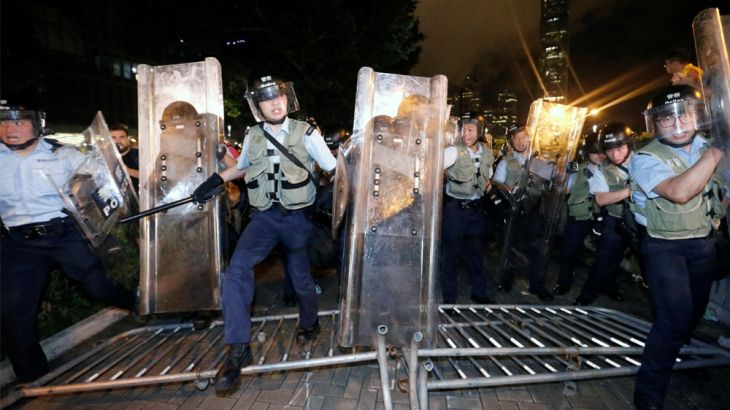
Hundreds of thousands of people marched through Hong Kong on Sunday in a bid to block a proposed law that would allow suspects to be sent to China to face trial.
The protest descended into violence in the early hours of Monday after protesters tried to force their way into the semi-autonomous Chinese territory’s parliament, which is expected to vote on contentious extradition bill in the coming days.
Keep reading
list of 4 itemsWorld Press Freedom Day: Gaza conflict deadliest for journalists
Israeli firms sold invasive surveillance tech to Indonesia: Report
Abu Ghraib: Iraqi victims’ case against US contractor ends in mistrial
Several hundred riot police armed with batons, shields, tear gas guns and pepper spray sealed off the Legislative Council as a similar number of protesters charged their lines, witnesses told Reuters news agency.
Police estimated the crowd at 240,000, but organisers said more than one million took part in what appeared to be the biggest protest since 2003 protest against a proposed national security law.
Organiser Civil Human Rights Front claimed it was the biggest rally in three decades, second only to a demonstration in 1989 that drew 1.5 million people in support of the Tiananmen Square protests in China.
Reporting from Hong Kong, Al Jazeera’s Sarah Clarke said that the main area around the legislative building had since been cleared of protesters, but more protests are expected in the coming days.
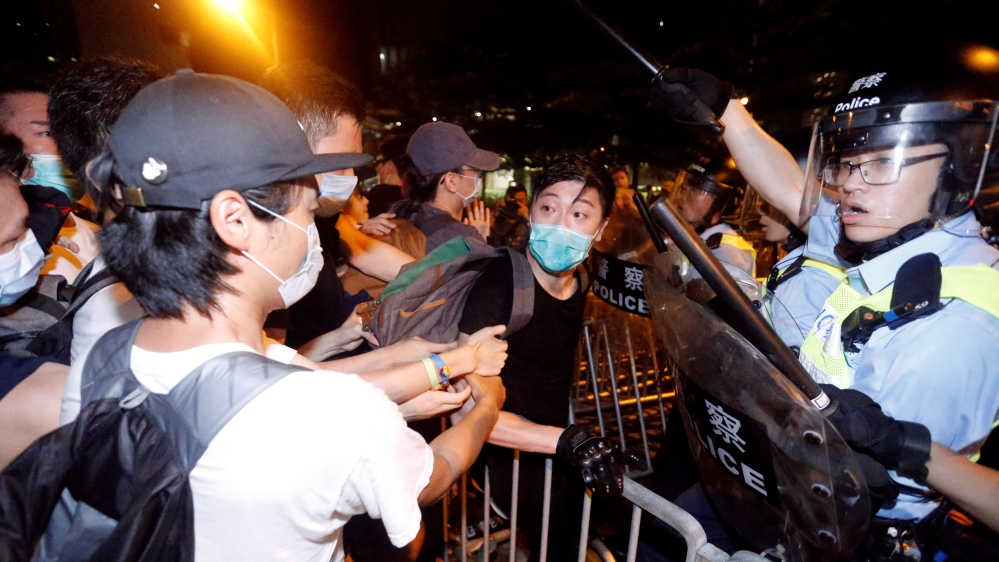
Police used batons and fired pepper spray at protesters, who still managed to close off part of a nearby road. Several people on both sides appeared to be injured, and ambulances were called.
Small groups of young protesters had planned to stay outside the city’s legislature until Wednesday when the extradition bill is due to have its second reading.
But police moved in on them after their permission to protest expired at midnight.
Within minutes scenes of chaos unfolded as protesters fought with officers who were soon backed by riot police.
An editorial in the official Chinese newspaper, the China Daily, said ‘certain foreign forces’ were trying to hurt Beijing by creating chaos in Hong Kong.
“Any fair-minded person would deem the amendment bill a legitimate, sensible and reasonable piece of legislation that would strengthen Hong Kong’s rule of law and deliver justice,” it said.
“Unfortunately, some Hong Kong residents have been hoodwinked by the opposition camp and their foreign allies into supporting the anti-extradition campaign.”
Rule of law
Hong Kong’s Chief Executive Carrie Lam has pushed forward with the legislation despite widespread criticism from human rights and business groups.
Opponents say that China’s legal system would not guarantee the same rights to defendants as in semi-autonomous Hong Kong.
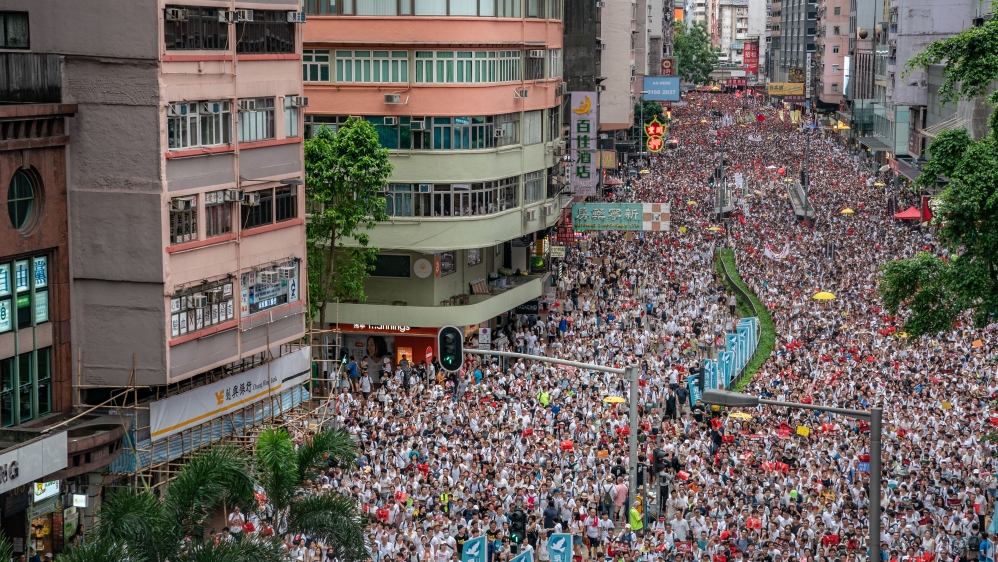
Protesters believe the proposed law before Hong Kong’s semi-democratic Legislative Council would damage the city’s rule of law and put many at risk of extradition to China for political crimes.
Protesters chanted “no China extradition, no evil law” while others called for Lam to step down. One protester held a sign reading “Carry off Carrie.”
Lam has tweaked the proposals but has refused to withdraw the bill, saying it is vital to plug a long-standing “loophole”.
However, people remain suspicious and question the fairness and transparency of the Chinese court system.
“[Lam] has to withdraw the bill and resign,” veteran Democratic Party politician James To told crowds gathering outside the city’s parliament and government headquarters in the Admiralty business district on Sunday night.
“The whole of Hong Kong is against her.”
A sea of protesters chanting slogans and demanding security chief John Lee to step down as they are stucked in Leighton Road in Causeway Bay #extraditionbill @SCMPNews pic.twitter.com/hB32PHkm2P
— Jeffie Lam (@jeffielam) June 9, 2019
The crowd on Sunday included young families pushing babies in prams as well as the elderly braving 32 degrees Celsius heat.
“Nobody trusts the mainland government, how can people feel they would get a fair trial in the mainland,” Claudia Mo, a legislative councillor in Hong Kong, told Al Jazeera.
“There is no due process there, and it means that people can just be whisked away across the border to face a biased court system.”
Clarke said the initial expectation of around 300,000 people joining the rally had been surpassed.
“Where the rally started at Victoria Park it was full and overflowing … we’ve seen people of all generations – pro-democracy activists, student union groups, and families who are joining this rally, united in their opposition to this extradition bill,” Clark said.
“But despite their efforts, this bill is likely to be passed. The Hong Kong government has the majority in the city’s parliament and the chief executive Carrie Lam wants a vote by the end of the month.”
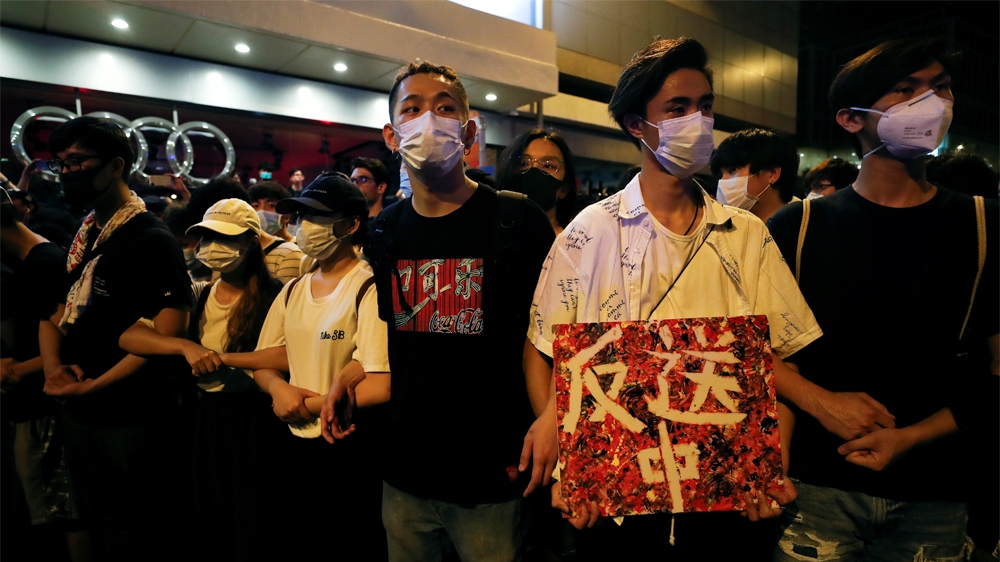
Yellow umbrellas
Demonstrators carried yellow umbrellas, which became a symbol of passive resistance during protests in 2014 when residents demanded more transparent elections from China.
Opposition to the proposed bill has united a broad range of the community, from usually pro-establishment business people and lawyers to students, pro-democracy figures and religious groups.
“I come here to fight,” said a wheelchair-bound, 78-year-old man surnamed Lai, who was among the first to arrive at Victoria Park.
“It may be useless, no matter how many people are here. We have not enough power to resist as Hong Kong government is supported by the mainland,” said Lai, who suffers from Parkinson’s disease.
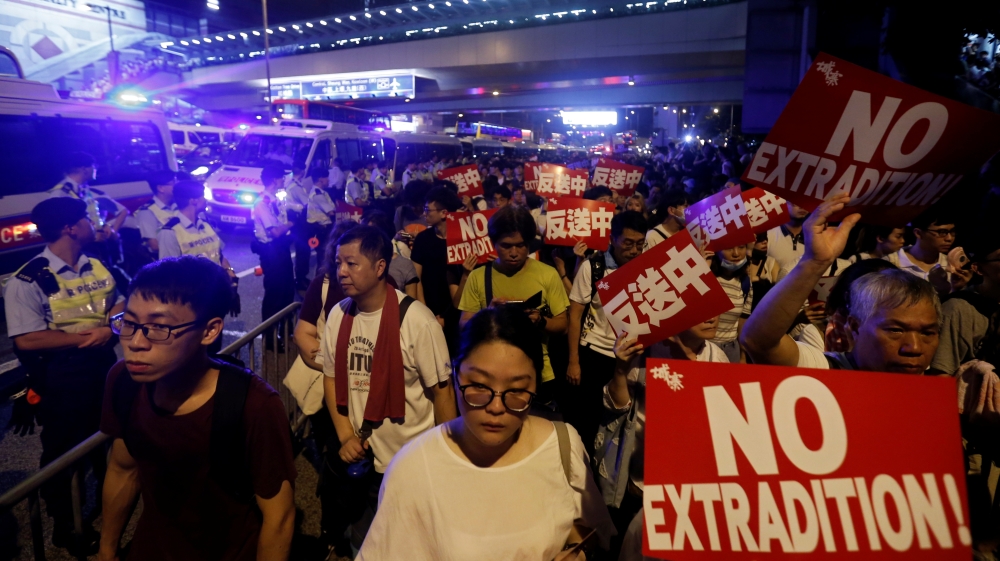
“I think it’s the worst law ever,” said Hera Poon, who brought her entire family to the rally. “We all understand that China is rocking the justice system in Hong Kong.”
Poon expressed concerns with China’s 99 percent conviction rate, compared to Hong Kong’s strong rule of law, and that extradition might be used to prosecute political prisoners.
“If the government aren’t happy with you they will charge you and make you guilty,” she said.
The marchers slowly made their way through the crowded Causeway Bay and Wan Chai shopping and residential districts to Hong Kong’s parliament, where debates will start on Wednesday into government amendments to the Fugitive Offenders Ordinance. The bill could be passed into law by the end of June.
The changes will simplify case-by-case arrangements to allow the extradition of wanted suspects to countries, including mainland China, Macau and Taiwan, beyond the 20 that Hong Kong already has extradition treaties with.
But it is the prospect of renditions to mainland China that has alarmed many in Hong Kong.
The former British colony was handed back to Chinese rule in 1997 amid guarantees of autonomy and freedoms, including a separate legal system.
“It’s a proposal, or a set of proposals, which strike a terrible blow … against the rule of law, against Hong Kong’s stability and security, against Hong Kong’s position as a great international trading hub,” the territory’s last British Governor, Chris Patten, said on Thursday.
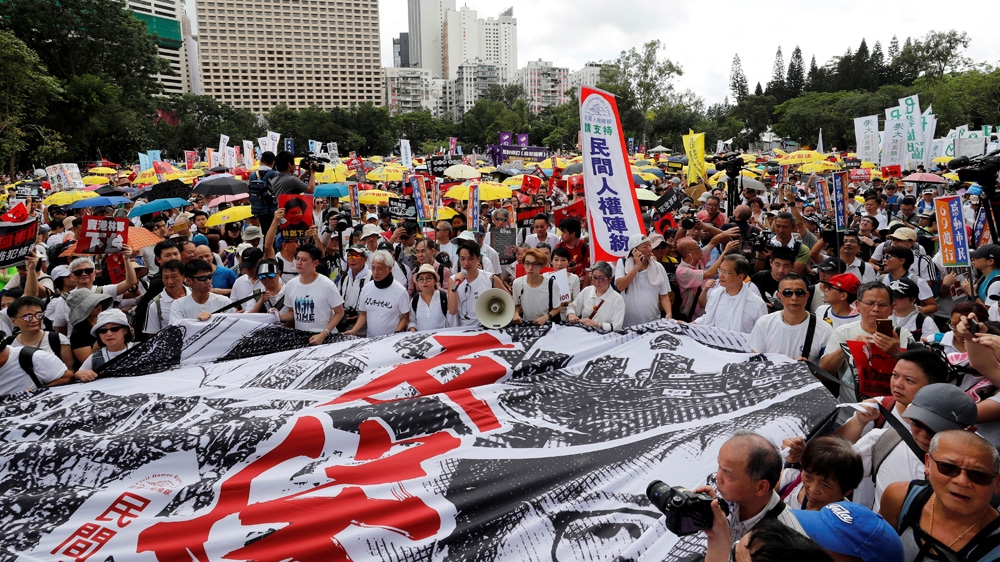
Foreign governments have also expressed concern, warning of the effect on Hong Kong’s reputation as an international financial hub, and noting that foreigners wanted in China risk getting ensnared in Hong Kong.
The concerns were highlighted on Saturday with news that a local high court judge had been reprimanded by the chief justice after his signature appeared on a public petition against the bill.
Human rights groups have repeatedly expressed concerns about the use of torture, arbitrary detentions, forced confessions and problems accessing lawyers.
Hong Kong government officials have repeatedly defended the plans, even as they raised the threshold of extraditable offences to crimes carrying penalties of seven years or more.
They say the laws carry adequate safeguards, including the protection of independent local judges who will hear cases before any approval by the Hong Kong chief executive.